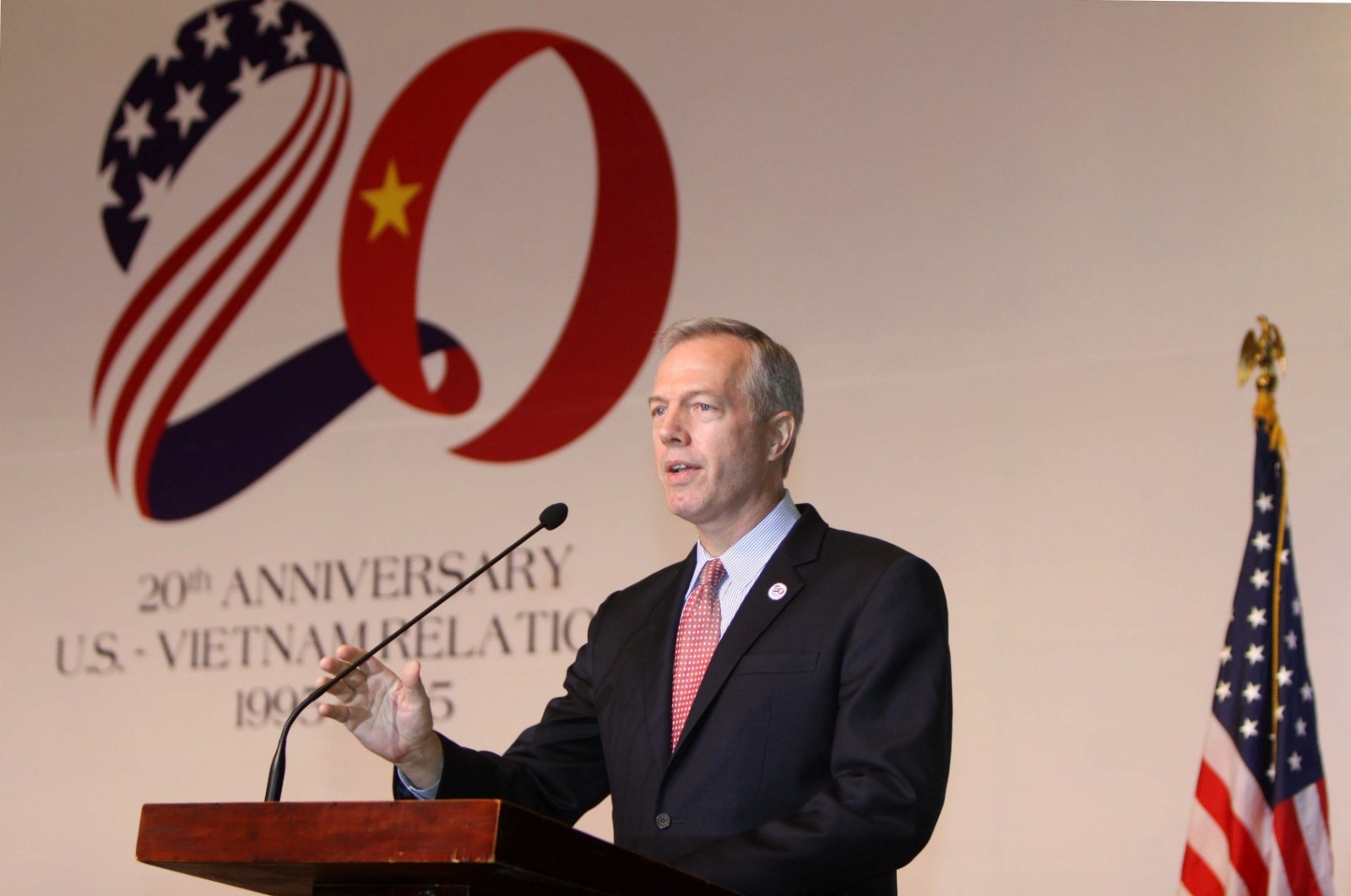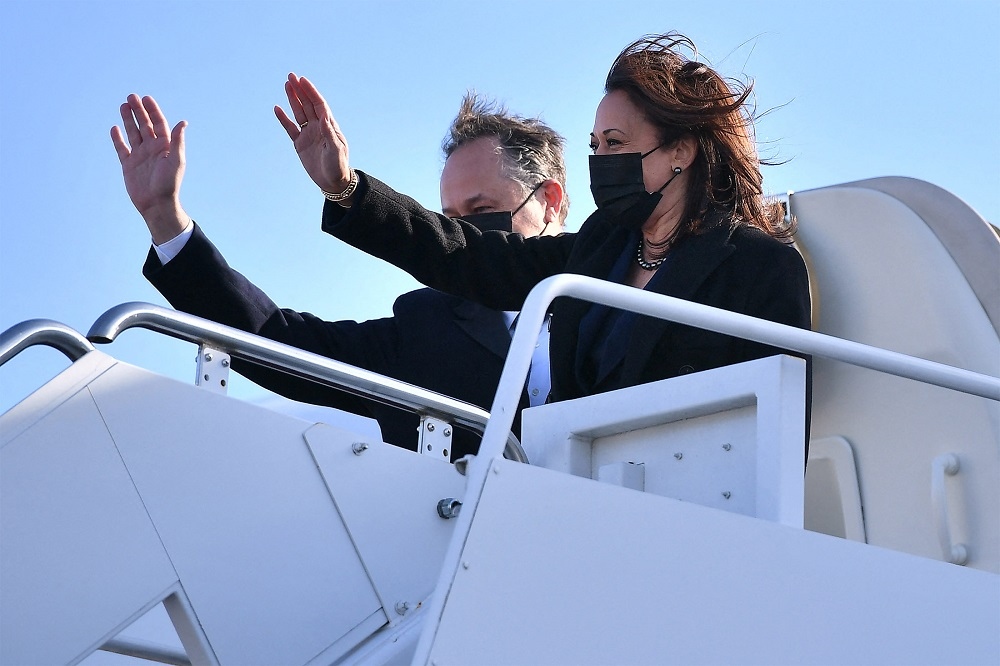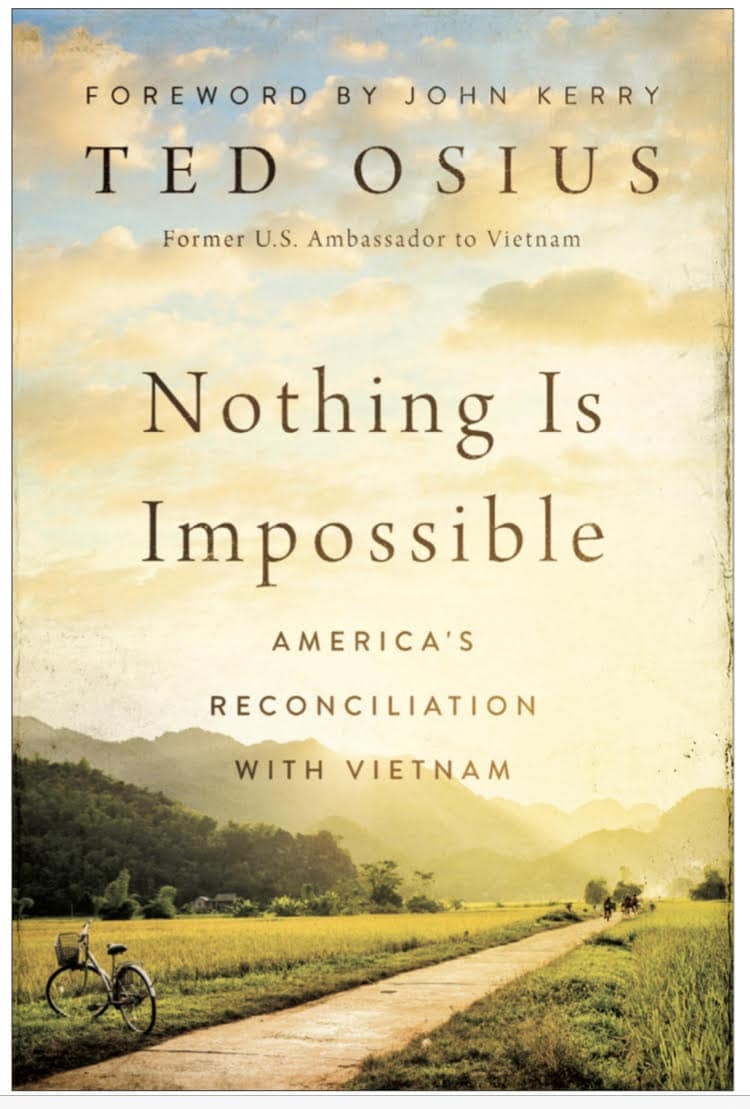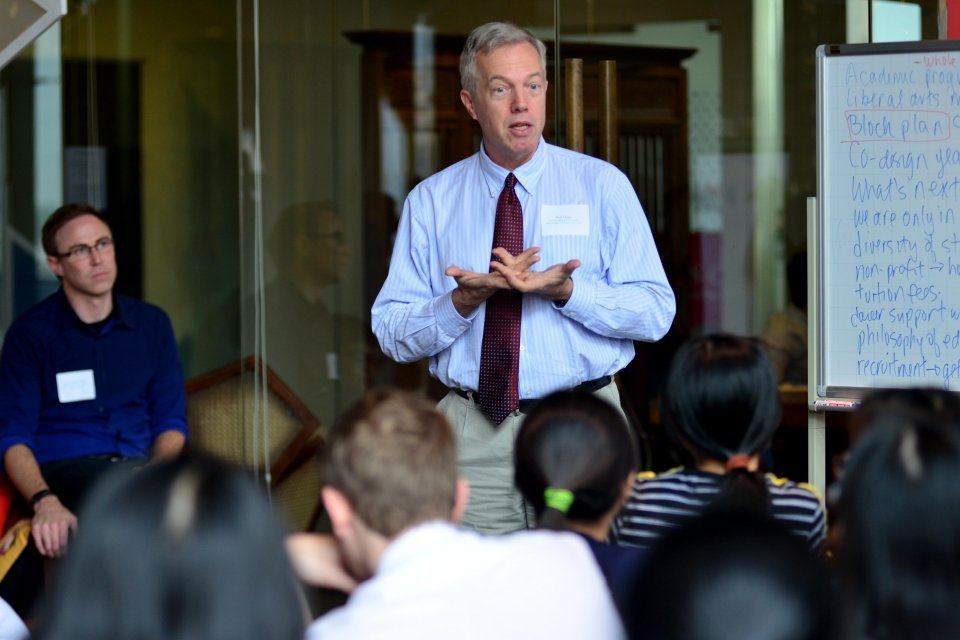
Former US Ambassador Ted Osius: In US-Viet Nam relations, ‘nothing is impossible’!
Latest
 |
| Former US Ambassador to Viet Nam Ted Osius spoke of US-Viet Nam relations during the celebration of US 239th Independence Day in 2015. (Photo: VNA) |
US Vice President Kamala Harris is going to officially visit Viet Nam from August 24 to August 26. This is the first official visit of a US Vice President and the second visit of a US Cabinet member to Viet Nam in less than a month. Why Viet Nam?
Well, I think Viet Nam is intrinsically important to the US because not only bilateral trade and investment is increasing rapidly, but also continuing US-Viet Nam reconciliation can show other countries that it is possible for two former adversaries to become true friends and collaborators.
When people visit Viet Nam, they are impressed by the country’s rapid economic progress, warm hospitality and the richness of its history and culture. There are more than 2 million Americans of Vietnamese origin. The US-Viet Nam educational ties are strong.
When you think about Viet Nam in the context of Southeast Asia, there are 10 ASEAN countries with 662 million people with a GDP of 3.2 trillion USD. Therefore, the region is very important economically to the US. The US private sector invested more than 388 billion USD in ASEAN last year. That is more than China, India, Japan and South Korea combined.
Also last year, the US exported more than 122 billion USD worth of goods and services to ASEAN, making ASEAN the 4th largest US trading partner after Canada, Mexico and China.
Moreover, the US has a fundamental interest in freedom of navigation and overflight, including in the East Sea. It also has an interest in the continued growth and prosperity of the nations that are on both sides of the Mekong River.
| “As a result, there are many things Vice President Kamala Harris can do in her visit, since there is a lot at stake. Viet Nam matters.” – Former US Ambassador to Viet Nam Ted Osius. |
US Secretary of Defense Lloyd Austin’s recent trip to Viet Nam has been well received. Therefore, US Vice President Kamala Harris’ upcoming visit at the early period of her term is also highly anticipated. Could you share some of your expectations for this historic trip?
This is the second overseas trip of Vice President Harris, and she picked Singapore and Viet Nam. It shows the great importance the administration places on ASEAN.
Secretary of Defense Lloyd Austin’s trip to Southeast Asia emphasized strengthening security ties. It means that Vice President Harris can discuss issues beyond security with Vietnamese leaders, including trade. Security and strategic engagement in ASEAN cannot take place without a strong trade and investment agenda.
Most countries in the region are export-oriented, including Viet Nam. Therefore, trade is a natural place for the US to re-engage in the Indo-Pacific. I think Vice President Harris has an opportunity to show that the US is back in Southeast Asia.
The private sector also understands that very well. I used to work for Google. The tech industry knows that Southeast Asia is the world’s fastest-growing internet market. The region has a digital economy expected to project beyond 300 billion USD by 2025.
All ASEAN countries, including Viet Nam, are focusing on post-pandemic recovery and a major portion of growth will come from digital economies.
Viet Nam has very ambitious aspirations for developing its digital economy. Vice President Harris can definitely focus on that.
 |
| Former US Ambassador Ted Osius believed that Vice President Kamala Harris can do a lot to promote bilateral relations in her upcoming visit to Viet Nam. (Photo: Reuters) |
A major area of cooperation in US-Viet Nam relations last year was in combating COVID-19 pandemic. According to The White House, a priority during Vice President Kamala Harris’ visit is cooperation in combating the COVID-19 pandemic. Should we expect further results in this area of cooperation?
I certainly hope so. The administration has provided a substantial number of vaccines to Viet Nam. Together with former Ambassadors, I had written and urged the President to provide vaccines to Viet Nam. Happily, the administration has listened.
Yet, I do not think that is the limit of our collaboration. There has been tremendous cooperation in public health between the two countries, with a rich history. We have had almost two decades of robust collaboration in the sector since the early 2000s, as both countries worked together to combat SARS and HIV/AIDS.
Many Vietnamese epidemiologists were trained in the US. Major emergency operation centers in the Northern, Central and Southern parts of Viet Nam have collaborated in real-time data sharing with the US Center for Disease Control (CDC).
Viet Nam’s public health system has developed rapidly, demonstrated through the country’s initial responses to COVID-19. Viet Nam was among the world’s best.
While the Delta variant has been tough on every country, including the US and Viet Nam, Viet Nam is ramping up and getting as many people in HCMC vaccinated as possible this month.
I believe the US will continue to be a strong partner of Viet Nam on COVID-19 emergency response and post-pandemic recovery. Vice President Harris’ visit is an opportunity to promote that collaboration even further.
You mentioned how US-Viet Nam relations have significantly developed over the years, regardless of our shared past. Is that the reason you named your recently published book about US-Viet Nam relations “Nothing is Impossible”?
Thank you for asking about the book. It is going to be shipped in early September to those who have pre-ordered. The book has an official release date of October 15th, but it is already in the hands of many people in the US and Viet Nam.
It is called Nothing is Impossible: America's Reconciliation with Viet Nam. The book talks about the 25 years of reconciliation that I have had the great privileges to witness and sometimes, played a part in. You can pre-order the book to get up to 30% discount here.
 |
| Former US Ambassador Ted Osius’s ‘Nothing is Impossible: America's Reconciliation with Viet Nam’ book shared stories of people who contributed to US-Viet Nam relations. (Photo: Rutgers) |
The reason for the title goes back to January 2015. Deputy Foreign Minister Ha Kim Ngoc, now Ambassador of Viet Nam to the US and other members of Viet Nam’s Ministry of Foreign Affairs hosted a conference on the 20th Anniversary of US-Viet Nam diplomatic relations.
I participated in that conference, along with Deputy Foreign Minister Ngoc, former US Ambassadors including Ambassador Pete Peterson, Michael Michalak and former Viet Nam Ambassadors such as Le Bang, along with others who participated in promoting US-Viet Nam relations. It was an amazing gathering of people who have contributed to the reconciliation.
At that conference, Ambassador Pete Peterson, one of my first bosses in Viet Nam, stood up and said: “You know, in US-Viet Nam relations, nothing is impossible!”. I thought it was exactly right. For me, it became kind a theme of my time as the US Ambassador in Viet Nam – nothing is impossible.
Deputy Foreign Minister, later Ambassador of Viet Nam to the US Ha Kim Ngoc also spoke powerfully: “We should move beyond bilateral cooperation to regional and global collaboration on issues that matter to the world.”
He was absolutely right. We have done that since I was the US Ambassador. Even today, Ambassador Ngoc continued to pursue that agenda of expanding our collaboration. For me, the conference was a special moment. Therefore, it gave my book the title.
Could you reveal some of the important points mentioned in your book?
It is not a policy wonk book or just for experts. It is a book of stories about people.
There were many people considered “heroes” of reconciliation. Some of them had big titles like former Secretary of State John Kerry, late Senator John McCain and former Vietnamese Minister of Foreign Affairs Nguyen Co Thach… But some of them did not. They were just private citizens, who participated in bringing two countries together. I try to tell the stories of people, because I think the stories of reconciliation are about people.
Therefore, the book tells the stories of people I got to know, both Americans and Vietnamese, over the 26 years I have been involved in Viet Nam. It tells stories of people taking great risks, being brave to overcome obstacles and bring two countries together.
Both countries realized that we could do much more together once we moved beyond the past and look at our shared future. So far, we have done that and are continuing to do so. It is an ongoing journey, but we have come a long way from being adversaries in the early 1990s to being close friends and partners in 2021.
 |
| Former US Ambassador Ted Osius talked with students of Fulbright Viet Nam University. (Photo: VNA) |
Your book showed that you have continued to love Viet Nam. As the President of US-ASEAN Business Council (USABC), do you plan to return to the country? How can USABC contribute to the post-pandemic recovery of ASEAN, including Viet Nam?
I absolutely plan to return to Viet Nam. As soon as the COVID-19 pandemic allows, I am going to come back. I continue to love Viet Nam and I cannot wait to return there. It is a very important part of who I am.
Regarding what US-ASEAN could do, while I am not the President of USABC for another week, I have been thinking a lot about what the USABC could do.
First, when it comes to COVID-19, there is the matter of emergency response. USABC is part of a global task force, dealing with providing oxygen to some of the countries that were hit the hardest, as well as diagnostics, health kits.
This is led by some of America’s biggest companies. USABC is a critical member of this coalition. Work was done first when India was hit really hard and US companies rose to the occasion and contributed a great deal in India.
Now, there is a big focus on Indonesia, as it is the epicenter of the pandemic right now. Companies are also looking at what they can do in Viet Nam, Thailand, Myanmar and other Southeast Asian countries hit hard by this new Delta variant.
Challenges remain: Currently, companies cannot buy, distribute and donate vaccines. I hope over time, as pharmaceutical companies increase their productions, the private sector will be able to contribute directly to vaccines distribution. I look forward to that day.
| “I continue to love Viet Nam and I cannot wait to return there. Viet Nam has become an important part of who I am.” – Former US Ambassador to Viet Nam Ted Osius. |
For post-COVID-19 recovery, there are a lot of opportunities, particularly in the digital economy. In my previous job, we worked with Temasek in Singapore to examine how ASEAN countries have been utilizing digital opportunities. Viet Nam has had one of the fastest-growing digital economies in the region, in spite of the pandemic.
Therefore, what USABC can do is help ASEAN nations to raise the standard in the digital realm. One example is the Digital Economy Partnership Agreements (DEPAs), which Singapore has entered along with New Zealand, Chile…
That promotes inter-operability between different regimes, addresses new challenges brought about by digitalization such as cross-border data flows. It is the gold standard for digital trade agreements. The US and Japan have a high standard digital trade agreement. The time is now to get ASEAN countries more harmonized with digital policies and digital trade.
Finally, as ASEAN countries recover from the pandemic, it is time to harmonize regulations. Due to the pandemic, countries have turned inwards somewhat. It is time to recreate the openness that has characterized ASEAN in the past, as well as in the future.
Moreover, it is necessary to keep the flows of information and trade uninterrupted. ASEAN should remain open to business and investment like it was in the past. Viet Nam can lead the way in that direction of greater openness in trade and investment. That is how USABC can help contribute to post COVID-19 recovery.













